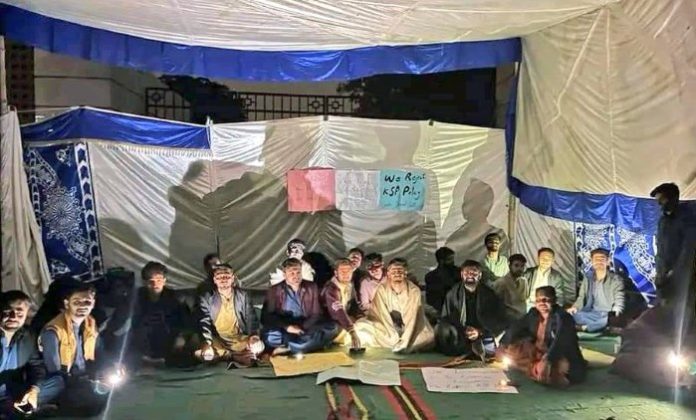In a concerning turn of events, the Sindh Police intervened in the ongoing student protests at Karachi University, arresting hunger-striking students who were demanding justice and fairness in the university’s policies. The arrests come in the wake of a series of protests against an indiscriminate fee hike and other pressing issues faced by the student body.
Students at Karachi University have been protesting against several grievances, including the implementation of the KSP-POLICY, discriminatory practices, and cultural heritage concerns. The administration’s alleged indifference to these concerns led to an escalation of the protests, with students resorting to a hunger strike as a last-ditch effort to draw attention to their demands.
Demands of Karachi University students
- Merit-Based Admissions: Opposing the KSP-POLICY that allegedly denies seats based on merit, students call for an end to injustice and the promotion of meritocracy in the educational system.
- Affordable Education: Protesters vehemently oppose exorbitant fee hikes and advocate for a fair and sympathetic resolution to ensure education remains accessible and affordable.
- Cultural Preservation: Expressing concern over the demolition of Shah Abdul Latif’s poetry, students demand the preservation of cultural heritage.
- Equal Accommodation: Urging the rectification of discriminatory practices, students call for equal access to hostels for all newly admitted female students.
- Transparency in Scholarships: Demanding transparency and timely disbursement of stipends for scholarships, students seek an end to delays in financial support.
- Infrastructure Concerns: Addressing a longstanding drainage issue near the central library, students call on the administration to take prompt action in ensuring a safe and functional environment.

Disturbing condition of students in Pakistan
The Sindh Police’s involvement in arresting hunger-striking students has sparked outrage, with many condemning the use of force against peaceful protesters. Earlier, a police officer threatened students with more force if they did not end their hunger strike, raising concerns about the suppression of legitimate voices.
This incident follows a disturbing trend in Pakistan, where student protests are met with force rather than open dialogue. The authoritarian approach by university administrations, often aligned with the government and military, raises questions about the stifling of dissenting voices.

